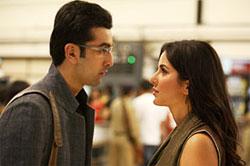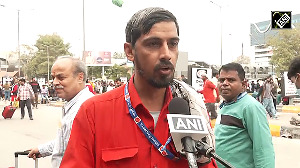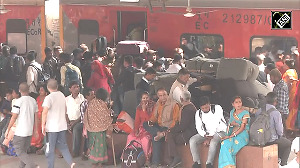Aayu Bovan, Vanakkam, Namaskaram, Good evening!
At one level it might seem a little odd for me to be addressing you all at the inauguration of the International Indian Film Awards. After all, I am a writer, and as a writer my attitude to our popular Hindi cinema can best be summed up in the tale of the two goats at a garbage dump outside a Bollywood studio, who are chewing away at discarded cans of celluloid. The first goat, chewing slowly, says, "you know, this film's not bad." The second goat, also chewing the celluloid, replies, "yeah, but the book was better."
So I believe the book is always better. That's why I even wrote a novel about the film world twenty years ago, called Show Business. But in fact I'm here because I've realized that Hindi cinema is perhaps India's most successful brand ambassador internationally.
Bollywood is bringing its brand of entertainment not just to the Indian diaspora in the US or UK but around the globe, to the screens of Sri Lankans, Syrians and Senegalese. During my years at the United Nations, I lost count of the number of African leaders who told me of their memories of growing up in little towns and villages looking forward to the arrival of a Hindi movie in the big city.
A Senegalese friend told me of his illiterate mother who takes a bus to Dakar every month to watch a Hindi film -- she doesn't understand the Hindi dialogue and, since she's illiterate, she can't read the French subtitles, but these films are made to be understood despite such handicaps; she can still catch their spirit and understand the stories, and people like her look at India with stars in their eyes as a result.
There's an Omani in this audience here tonight who owns all the movie theatres in Muscat and shows mainly Bollywood movies. When I asked him, "Oh, you have lots of Indians there, hanh?" he replied, "No, my audiences are 80% Arab." An Indian diplomat friend in Damascus a few years ago told me that the only publicly-displayed portraits in that city that were as big as those of then-President Hafez al-Assad were those of Amitabh Bachchan.
And here in Colombo, I was discussing politics with a senior Sri Lankan, talking about whether his kids knew both the Sinhala and Tamil languages, and he replied: "Thanks to your movies, they're speaking Hindi!"
So our films are part of India's soft power in the world, and today they are reaching ever-wider international audiences: During the last year three of them, including Kites last week, opened in the US amongst the top ten grossing films of the week. Indeed, it's Bollywood that has helped India demonstrate that is a player in globalisation, not merely a subject of it.
 And while our films are primarily about entertainment, their themes enshrine the values of diversity and pluralism that embody the best of what India is. Our cinema industry embodies the very
And while our films are primarily about entertainment, their themes enshrine the values of diversity and pluralism that embody the best of what India is. Our cinema industry embodies the very
People of different backgrounds and upbringing are shown to be brothers; good and bad are always shown as being found in every community. These are the values which India stands for. And our popular films offer all of us in India a common world to which to escape, allowing us to dream with our eyes open.
Today we celebrate Indian cinema in Sri Lanka, a country just recovering from the ravages of civil war. The end of the conflict with the LTTE has presented Sri Lanka with an opportunity to heal the wounds created by decades of protracted conflict, to make a new beginning and to build a better future for all its people. It has also opened up greater options for India and Sri Lanka to cooperate and enlarge our areas of engagement.
We all know that there are some in India who would rather have preferred that we were not here. The condition of the Tamil people of Sri Lanka is both an emotional and a political issue in our country. But India has never shirked from making known its legitimate concerns, and our engagement on this issue has been received in a very constructive spirit by the government of Sri Lanka.
India had strongly supported the right of the government to act against terrorist forces. At the same time, India has emphasised the importance of focusing on issues of relief, rehabilitation, resettlement and reconciliation, and the Indian people are proud that our government is working actively in assisting in these 'four Rs' in Northern and Eastern Sri Lanka. A fifth 'r' -- the redevelopment of the war-affected areas -- is the next priority.
Though I speak in a purely personal capacity, I am confident that India will continue to remain engaged with the task of helping people to resume their lives which had so cruelly been interrupted by conflict. And we would all want to see a political consensus here to give the Tamil people of Sri Lanka an honoured place in their own country, within the framework of a united Sri Lanka, consistent with democracy, pluralism and respect for human rights. We wish Sri Lanka well in its efforts to accomplish this.
Today, World Environment Day, is an occasion for celebration. India and Sri Lanka need to look to the future, to a future in which our geographical proximity becomes a reason for closeness rather than controversy, where the past reminds us not of recent pain but of ancient commonalities, where religion and culture bring us together in a celebration of our common heritage.
Lord Rama came to Lanka to reclaim Sita and left; Ashoka's envoys brought Buddhism to Lanka and stayed. These ancient links unify us in spirit, in the spirit of the timeless tides that wash our shores and that have tied us together for millennia. It is now the film world's turn to build a new bridge to Lanka, a Rama Setu of the imagination.
I wish IIFA and all of you a memorable evening.
Image: Ranbir Kapoor and Katrina Kaif in Prakash Jha's Raajneeti, one of the year's big hit movies.








 © 2025
© 2025